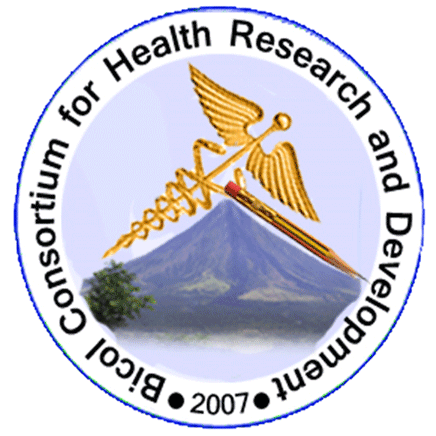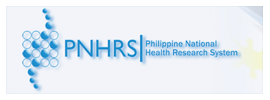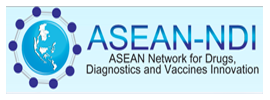Updates
- Details
- Category: Updates
HERDIN stands for Health Research and Development Information Network, a research repository / database with over 40 thousand records of health research articles and health researches about the Philippines or Filipinos, authored by Filipinos or non-Filipinos, published and unpublished.
To be able to access the research information network, BCHRD organized a HERDIN training on November 28, 2012 at the Bicol University, College of Nursing. Three speakers/trainers from PCHRD came to Legazpi City to provide the participants with the knowledge and skills needed in the setting up/operating of a research database in their respective institutions that could be linked with the regional (BCHRD) and national research repositories.
The said speakers/trainers were: Mylene B. Marco who gave the mechanics of the workshop, Meychell Angoy, who lectured on the technical aspect of HERDIN, and Ronel D. Molina, who lectured on data inputting (setting up, updating, enhancing, and maintenance of the Consortia website).
The training workshop was participated by a total of twenty seven (27) point persons for research database from member and non-member agencies. The participants were given the HERDIN User’s Guide / Manual as reference for the technical aspect of HERDIN. The database can be searched for free at http://www.herdin.ph
Data inputting of the researchers and researches in Region V will be done in 2013. The inventory of these researchers and researches in the region is still ongoing.
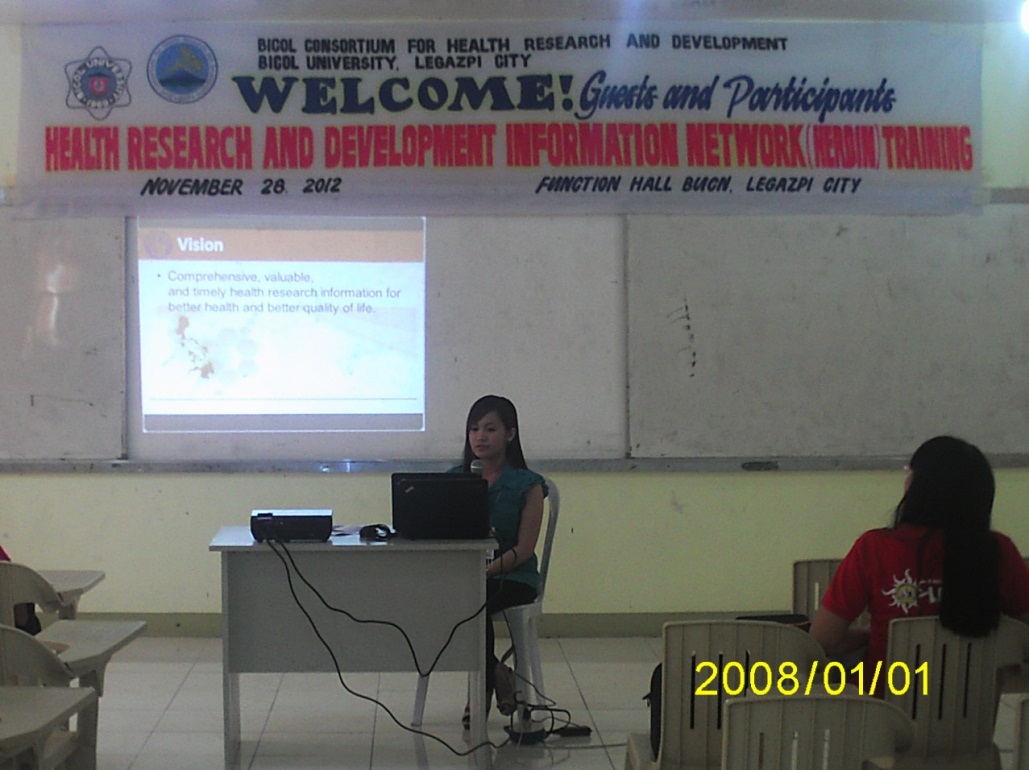
Ms. Meychell Angoy (above) explaining the technical aspect of HERDIN.
- Details
- Category: Updates
The BCHRD facilitated a two day write-shop for researchers in the region on November 14-15, 2012. Its main objective was to generate fundable research proposals that are reflective of the priority research agenda of the region.
The pre-workshop phase was highlighted by the presentation of the Research Agenda of Region V by R & D Chair Dr. Marlyn Daguno, to guide the participants on the research priorities of the region. Following the presentation were lectures on “Problem Conceptualization” and R & D Methodologies (Quantitative) including Basic Statistical Test and Analysis by Dr. Yolanda Castroverde, an R & D member, and Dr. Maridel Borja, from University of the Philippines, Manila.
Three (3) research proposals were presented and evaluated by the R & D committee (Dr. Marlyn Daguno and Prof. Elma Peralta), with Dr. Borja, as guest evaluator. The proposals were as follows: 1) Urban Wastes and Environment: Effect on People’s Health by Dr. Yolanda Castroverde of University of Nueva Caceres, 2) “Follow-on” and “Toddler Formula” Using Adlai Grains by Dr. Janet Recierdo of Bicol University, and 3) Wound Healing Properties of Guyabano Leaves (Anona muricata Linn) and Malunggay Root (Moringa oleifera) Extract: A Product Development by Dennis Gogola of Bicol University.
The research entitled Urban Wastes and Environment: Effect on People’s Health by Dr. Yolanda Castroverde was technically approved by R & D committee and was submitted to the Bicol Medical Center, Naga City for ethical review. The ERC of the consortium had already reviewed it ethically. This proposal was submitted to the Philippine Council for Health Research and Development for funding under the Regional Research Fund (RRF).
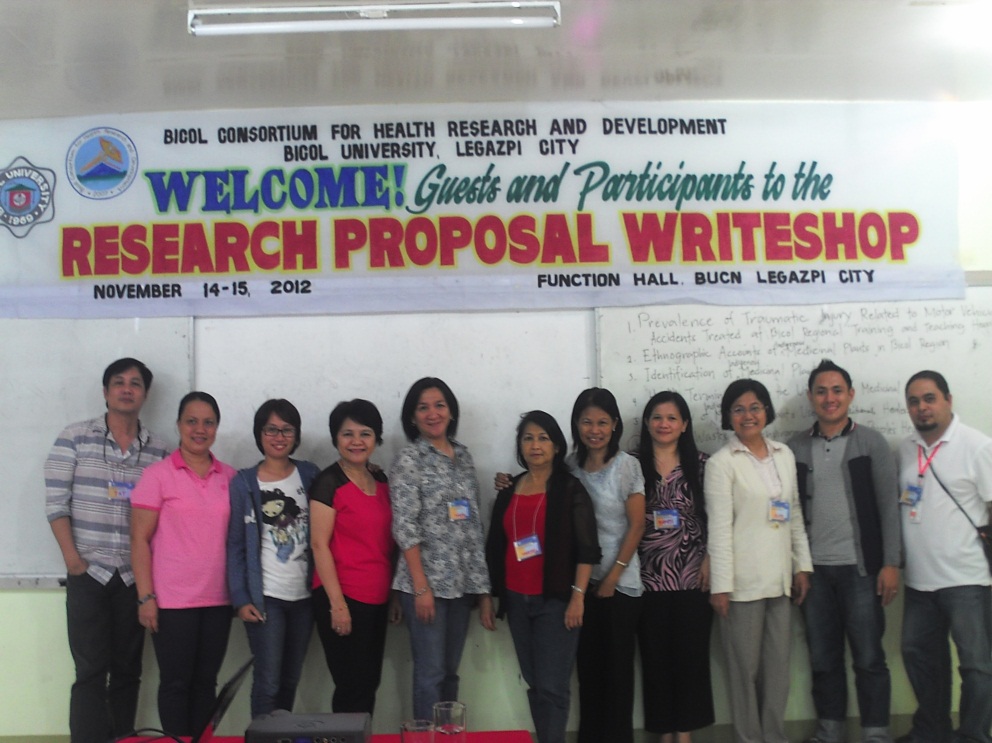
(left) Participants of the research proposal write-shop pose with R & D committee chair Dr. Daguno, committee member Prof. Peralta, and guest evaluator Dr. Borja.
- Details
- Category: Updates
The Basic Ethics training was a two-and-a-half-day training workshop (October 29-31) organized by the Philippine Health Research Ethics Board (PHREB), Philippine Council for Health Research and Development (PCHRD) and Bicol Consortium for Health Research and Development (BCHRD).
The main objective of the training was to build the capacity for quality ethics review processes in research institutions. A total of twenty four (24) participants composed of the member institutions of the BCHRD and allied health workers of health agencies in Region V were the recipient of the research ethics concepts.
The speakers from the PHREB were: Dr. Cecilia Tomas, Chair of the PHREB-Subcommittee, Standards and Accreditation and Dr. Maria Salome Vios. With them were two members of the PHREB Secretariat, Ms. Marie Jeanne Berroya, who is also the Regional Coordinator for Region V and Mr. Nico Angelo Parungao.
The participants were welcomed by Dr. Alma Sorrera-Banua, BCHRD Director and Dr. Amelia Dorosan, VPAA of Bicol University, who mentioned the importance of respecting the rights of subjects of the research, of organizing an institutional ERC, and of maintaining a functioning ERC.
Among the topics discussed were the following:
1) Ethical Principles in Research (International & National)
2) Ethics and Ethical Issues in Research Proposal
A. Benefits/Risk Assessment
B. Informed Consent
C. Ethics Review Committees and Review Process
D. Ethical Issues: Vulnerable Participants, Conflict of Interest, Inducements, Use of Biologic Samples, Community Considerations
3) PCHRD Registration & Accreditation of ERCs
4) Authorship & Publication
5) SOPs for ERCs
6) National Framework for Protection of Human Research Participants

The participants were able to realize the importance of ensuring that researchers follow the highest ethical standard, observe the safety of the human participants, and ensure the quality of research output.
BCHRD Director Dr. Alma Banua welcomes the participants during the Basic Ethics Training.
- Details
- Category: Updates
The Bicol Consortium for Health Research and Development conducted a Strategic Planning Workshop last October 9-10, 2012 at the Bicol University College of Nursing, Legazpi City. The objective of the workshop was to 1) identify and understand the BCHRD’s internal and external environment, including the major trends and events affecting it; and 2) generate/formulate a shared Vision, Mission, Goals/Objectives and Strategies for the BCHRD within the next 3 years.
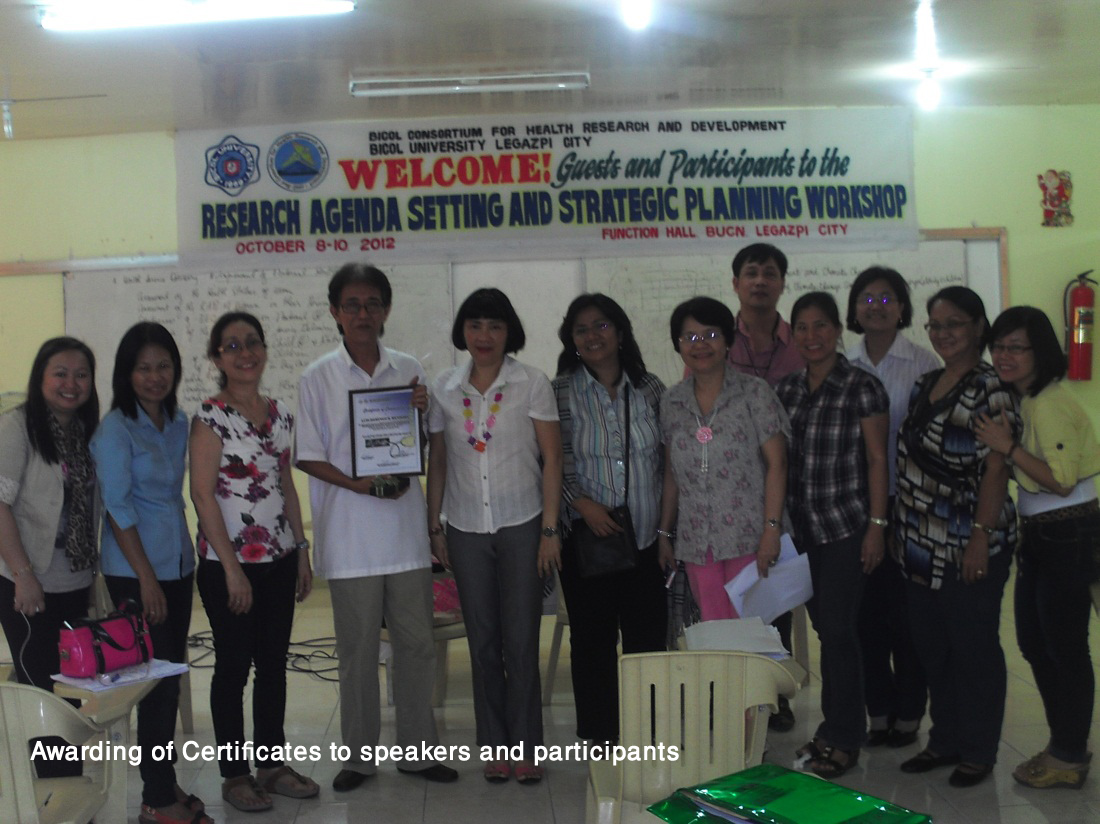
The activity was facilitated by Engr. Ellen P. San Juan, President & Managing Director of Transformation OptimizerProfessionals Inc. A total of thirteen (13) member agencies participated and came up with the Vision, Mission, Goals, Objectives, CoreValues, and the SWOT analysis for the operation of the consortium. The output of the workshop was as follows:
Vision: We are a nationally recognized from prime mover of excellent health and health related researches responsive to the needs of the Bicolanos towards improved quality of life.
Mission: We are a consortium of committed research institutions that produce quality health researches adhering to the highest ethical standards by collaborating with stakeholders and building the capacity of the researchers in the Bicol Region.
Goals:
1. Quality of Researchers: enhancement of researchers’ capacity and capability
2. Researches: undertake quality health and health related R & D activities
3. Recipient of various institutional awards from recognized award-giving bodies.
4. Establishment of linkages between and among S &T / R & D networks.
5. To produce quality researches that will improve the health conditions of Bicolanos.
6.To establish a dynamic, innovative, and collaborative organization that upholds good governance.
Specific Objectives:
- To increase the number of competent researchers by at least 3% in 3 years.
- At least 3 completed collaborative researches.
- To publish 3 completed research in peer reviewed journals.
- Come up with 9 approved quality health researches and receive at least 3 major awards from recognized award-giving bodies: (PNHRS, CHED Zonal Research Center, CHED- NHERA, and FNRI)
- Establish and strengthen linkages between and among Research and Development / Science & Technology networks.
- Produce one health research program on Maternal and Child Health and Nutrition for implementation of concerned institutions.
- Increase the number of member institutions by 50 per cent.
Core Values
- Commitment
- Integrity
- Innovativeness
- Respect
- Teamwork
Strengths
1. Internal Strengths
a. Increased number of committed member institutions/ agencies
b. Strong research capabilities of member institutions/ agencies
c. Basic training programs in place
d. Desire to make committees functional
e. Drafted research priorities for the region
f. Initial re-alignment of R & D’s with the NUHRA by some member institutions.
g. Capability to conduct clinical/ experimental researches.
h. Availability of ISO accredited Analytical Laboratory ( DOST )
i. Availability of IPOPHIL office at BURDC
j. With ongoing inventory of researchers, researches, and their training needs
k. Strong commitment of member institutions
l. Well-defined mission and vision
m. Well-established research department with member institution
n. ISO-accredited RDC of the base institution - Bicol University
o. Expanding membership from 5 to 15.
p. Committed pool of researchers (multidisciplinary with ISO accreditation)
2. External Opportunities
a. Wide S & T networks
b. More funding institutions (e.g. DOST central office, JICA, WHO, UNESCO, UNICEF, FAO, KOIKA, AECID, National and Local Government agencies)
c. Supportive partner institutions
d. Develop in-line linkage with international institutions like hospitals and universities (E-Libraries)
e. Bilateral Cooperation between BCHRD & institution abroad - exchange researchers
f. Existence of PCHRD scholars’ society
g. Strong support of the government (RA 8503 and HB 564)
h. Regional economic growth of 26%
i. Liberalization of the telecommunication industry
j. Technology transfer
k. Access to seminars trainings in and out of the country
l. Good governance (LGU’s receptive to research undertakings and utilization of research findings)
Threats
1. External
a. Priority program of Government (National Local)
b. Lack of support from private hospitals in conducting research and implementation of research outputs
c. Problems in peace and order situation
d. Inaccessible research settings
e. Lack of support from External Funding Institutions
f. Lack of awareness and support from the community
a. Change of government due to elections, priorities/ agenda, funding, mechanism, choice of people (cabinet, etc.)
b. Pressure / enforcement by international groups
c. World trend (can’t cope)
g. Undefined linkage between health researchers, policy makers, health program developers, and practitioners
h. Region 5 unemployment rate of 37.7% as of July 2012
i. Increase in population (2.7%)
j. Magnitude of poverty
k. Social development challenges
l. High percentage in terms of not meeting family planning needs of the region
2. Internal (Areas of Improvement)
a. Minimal research output
b. Low level of information dissemination and utilization of research output
c. Low level of interest to conduct research
d. Absence of strategic direction and long term development plan
e. Limited resources (manpower, financial constraints, etc.)
f. Absence of office and other facilities
g. Internal policies that restrict the consortium operation
a. Institutionalization not yet realized
b. BCHRD Operations with reference to base agency/ member institutions, office, financial management, other support services
h. Lack of skills among members of respective departments of member institutions
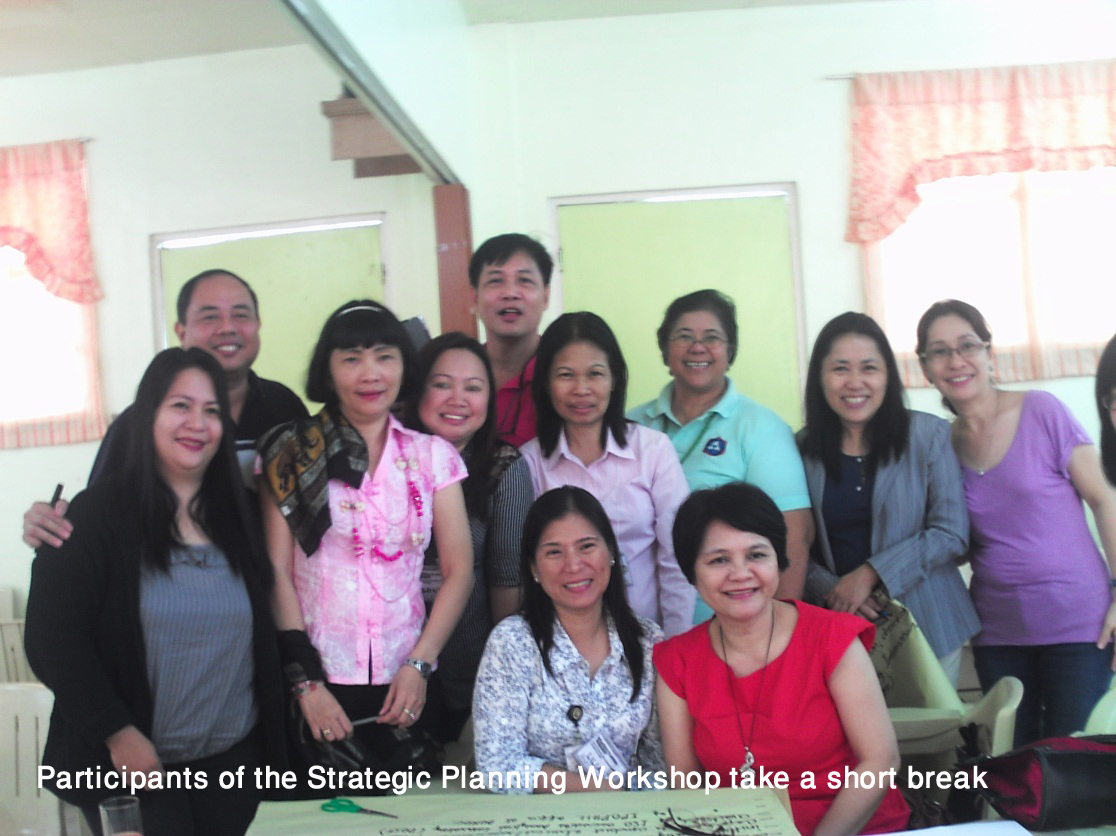
- Details
- Category: Updates
The Bicol Consortium for Health Research Development held a one day Research Agenda Setting Workshop last October 8, 2012 at the Function Hall of Bicol University Legazpi City. Its objective was to identify areas for research that should be given high priority in the region.
The BCHRD members were welcomed by Dr. Alma Banua, the consortium director. Dr. Fay Lea Patria Lauraya, BU President and BCHRD Chairperson delivered an inspirational message, focusing on the importance of research to the Bicolanos. She emphasized researches on Indigenous Herbs in the Region that can be linked to “Tuklas Lunas”, a drug discovery and development program initiated by DOST-PCHRD to provide solutions to the country's medical needs.
There were thirteen member-agency-participants, namely: Elma Peralta (Ateneo de Naga University), Lilian Legson & Hermogena Cañares (Aquinas University of Legazpi), Richard Bartolata (Bicol University), Marlyn Daguno (Bicol Regional Training and Teaching Hospital), Pilita O. Lucena (Department of Science and Technology), Sandy Lasa (Universidad de Santa Isabel), Carmelita Baylon (University of Nueva Caceres), Marla Litam, M.D. (Bicol Medical Center), Joyce Obis (University of Saint Anthony), Dr. Luis Mendoza (Department of Health-Albay Division), and Marie Jeanne Berroya ( Regional Project Officer for Region V from PCHRD).
The workshop proper started with the presentation by Director Banua of statistical data on the health profile of region V. It was followed by a “Problem tree analysis” facilitated by Dr. Yolly Castroverde.
Five Thematic Areas identified during the workshop were as follows: 1) Health service delivery, 2) Health Development, 3) Socio-environmental health concerns, and 4) Health Technology Development, and 5) Health financing. Following is The Research Agenda For Region V.
A. HEALTH SERVICE DELIVERY
1. Improvement of Maternal Health and Nutrition
a. Assessment of the health status of women
b. Assessment of the KAPs of women in their Perinatal Period
c. Effectiveness of IEC materials on maternal health care
d. Evaluation of the maternal health service delivery
2. Improvement of Child Health and Nutrition
a. Assessment of the Health Status of Children
b. Assessment of Feeding Programs in Day Care Centers (3 -6 y/o)
c. Infant Feeding Program
d. Review and Analysis of the Existing BEmONC/CEmONC in terms of Facilities, human resource expertise, usage and usefulness
e. Compliance with EPI
f. Evaluation of the Family Planning Program
B. HEALTH DEVELOPMENT
1. Prevention of Non-communicable Diseases
a. Mental Health
b. Lifestyle Diseases (diabetes, hypertension, cardiovascular diseases)
c. Trauma and Injuries
2. Prevention of Communicable Diseases
a. STI & HIV
b. TUBERCULOSIS (MDR)
3. Herbal Plants in Various Forms
a. Inventory of Herbal Plants in the Bicol Region(including pictures, location, parts of the plants used, common names and uses)
b. Preparation and utilization of indigenous herbs for common illnesses
c. Dosage forms of herbal medicine
4. Functional Foods
Beneficial/potential hazards of the following: Malunggay, Ginger, Garlic, Yakon, Cassava and Siling Labuyo
C. SOCIO- ENVIRONMENTAL HEALTH CONCERNS
- Environment and Climate Change
A. Health effects of Climate Change among Vulnerable Groups (Elderly and Children)
- Community Development
- Health and sanitary practices among residents of resettlement areas
- Health preparedness and capabilities during emergencies
- Waste Management
- Level of Implementation of Local Ordinances on Waste Management
- Hospital Waste Management
D. HEALTH TECHNOLOGY DEVELOPMENT
- Technology Development
- Techno Verification on for health use.
- Utilization and Production of Yakon Chips as Dietary Food Supplement
- Knowledge Management
- Adoption of Health Data Base System in the Bicol Region
- Surveillance of Reported Infectious Diseases
F. HEALTH FINANCING
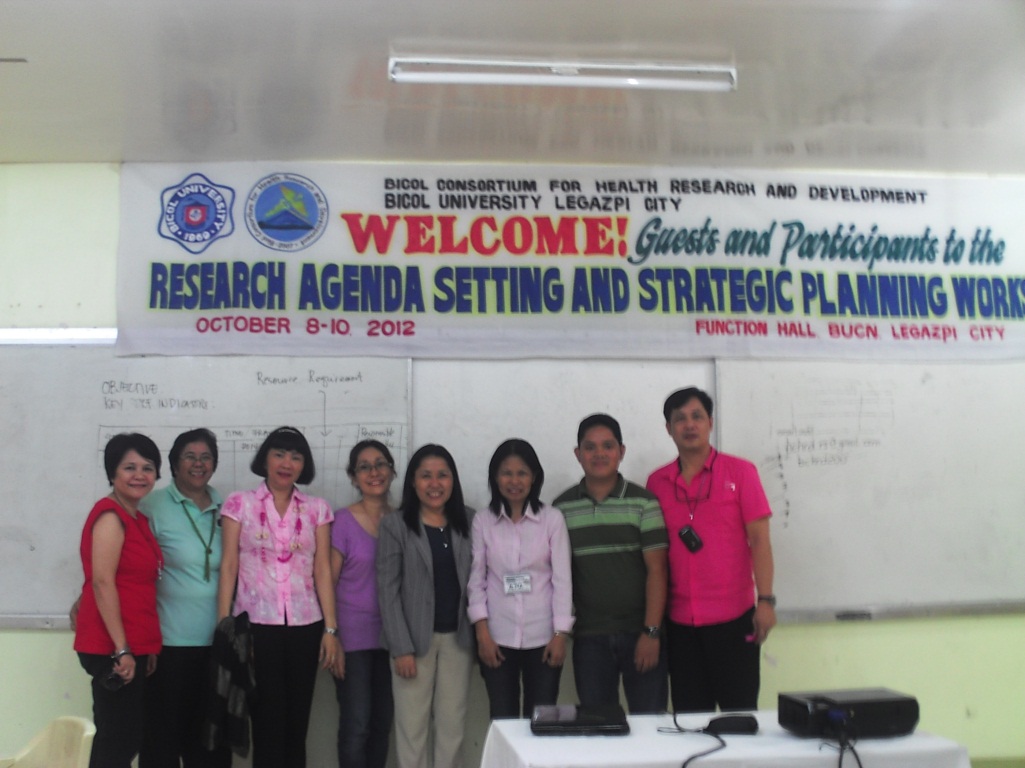
The participants during the two-day gruelling Research Agenda Setting and Strategic Planning Workshop.





